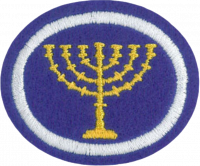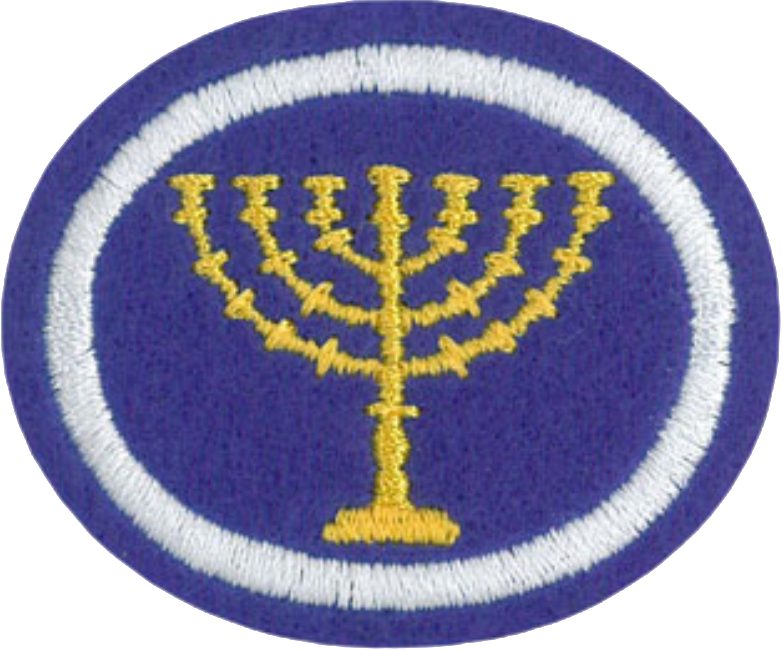Difference between revisions of "AY Honors/Sanctuary/Requirements 2/es"
(Created page with "</noinclude>Nombrar el mobiliario creado para cada sección del santuario. Explicar qué materiales (madera, oro, pieles, etc.) se usaron para hacer cada parte. Explicar lo qu...") |
(Created page with "</noinclude>Dibujar un modelo a escala del santuario en una hoja de papel de 11 x 17 (A4), el atrio y la posición de todo el mobiliario (no olvidar de añadir las direcciones...") |
||
| Line 12: | Line 12: | ||
<noinclude></noinclude><section end=req1b /></b> | <noinclude></noinclude><section end=req1b /></b> | ||
| − | :<b>c. <section begin=req1c /><noinclude> | + | :<b>c. <section begin=req1c /><noinclude></noinclude>Describir el número y tipo de cubiertas del santuario. Indicar lo que representa cada cubierta. |
| − | </noinclude> | + | <noinclude></noinclude><section end=req1c /></b> |
| − | <noinclude | ||
| − | |||
| − | :<b>d. <section begin=req1d /><noinclude> | + | :<b>d. <section begin=req1d /><noinclude></noinclude>Crear una lista de por lo menos 10 palabras que cree que deben entenderse completamente para que la historia del santuario tenga sentido. Crear una definición básica para cada una de las palabras. |
| − | </noinclude> | + | <noinclude></noinclude><section end=req1d /></b> |
| − | <noinclude | ||
| − | |||
| − | <b>2. <section begin=req2 /><noinclude> | + | <b>2. <section begin=req2 /><noinclude></noinclude>Dibujar un modelo a escala del santuario en una hoja de papel de 11 x 17 (A4), el atrio y la posición de todo el mobiliario (no olvidar de añadir las direcciones cardinales).<noinclude></noinclude><section end=req2 /></b> |
| − | </noinclude> | ||
| − | <noinclude | ||
| − | |||
| − | <b>3. <section begin=req3 /><noinclude> | + | <b>3. <section begin=req3 /><noinclude></noinclude>Participar en una actividad de Mirar/Pensar/Preguntar con imágenes artísticas del santuario. Escribir en un diario/tomar notas acerca de lo que MIRE cuando vea cada imagen, lo que PIENSE cuando vea la imagen y lo que SE PREGUNTA ACERCA DE DIOS cuando vea cada imagen. Las imágenes mostradas (impresas o por medios) deben incluir: |
| − | </noinclude> | + | <noinclude></noinclude><section end=req3 /></b> |
| − | <noinclude | ||
| − | |||
| − | :<b>a. <section begin=req3a /><noinclude> | + | :<b>a. <section begin=req3a /><noinclude></noinclude>El santuario y el atrio |
| − | </noinclude> | + | <noinclude></noinclude><section end=req3a /></b> |
| − | <noinclude | ||
| − | |||
| − | :<b>b. <section begin=req3b /><noinclude> | + | :<b>b. <section begin=req3b /><noinclude></noinclude>El altar del holocausto |
| − | </noinclude> | + | <noinclude></noinclude><section end=req3b /></b> |
| − | <noinclude | ||
| − | |||
| − | :<b>c. <section begin=req3c /><noinclude> | + | :<b>c. <section begin=req3c /><noinclude></noinclude>El lavacro |
| − | </noinclude> | + | <noinclude></noinclude><section end=req3c /></b> |
| − | <noinclude | ||
| − | |||
| − | :<b>d. <section begin=req3d /><noinclude> | + | :<b>d. <section begin=req3d /><noinclude></noinclude>El candelabro |
| − | </noinclude> | + | <noinclude></noinclude><section end=req3d /></b> |
| − | <noinclude | ||
| − | |||
| − | :<b>e. <section begin=req3e /><noinclude> | + | :<b>e. <section begin=req3e /><noinclude></noinclude>La mesa para el pan de la propiciación |
| − | </noinclude> | + | <noinclude></noinclude><section end=req3e /></b> |
| − | <noinclude | ||
| − | |||
| − | :<b>f. <section begin=req3f /><noinclude> | + | :<b>f. <section begin=req3f /><noinclude></noinclude>El altar del incienso |
| − | </noinclude> | + | <noinclude></noinclude><section end=req3f /></b> |
| − | <noinclude | ||
| − | |||
| − | :<b>g. <section begin=req3g /><noinclude> | + | :<b>g. <section begin=req3g /><noinclude></noinclude>El arca del pacto |
| − | </noinclude> | + | <noinclude></noinclude><section end=req3g /></b> |
| − | <noinclude | ||
| − | |||
| − | :<b>h. <section begin=req3h /><noinclude> | + | :<b>h. <section begin=req3h /><noinclude></noinclude>El sumo sacerdote |
| − | </noinclude> | + | <noinclude></noinclude><section end=req3h /></b> |
| − | <noinclude | ||
| − | |||
| − | <b>4. <section begin=req4 /><noinclude> | + | <b>4. <section begin=req4 /><noinclude></noinclude>Descubrir y discutir lo siguiente en pequeños grupos. Hacer que alguien en cada grupo tome notas para compartir con grupos más grandes o con su instructor. |
| − | </noinclude> | + | <noinclude></noinclude><section end=req4 /></b> |
| − | <noinclude | ||
| − | |||
| − | :<b>a. <section begin=req4a /><noinclude> | + | :<b>a. <section begin=req4a /><noinclude></noinclude>¿Por qué los israelitas necesitaban un santuario? ¿Era para el beneficio de Dios o el de ellos? Consultar Éxodo 25:8-10 cuando crea su respuesta. |
| − | </noinclude> | + | <noinclude></noinclude><section end=req4a /></b> |
| − | <noinclude | ||
| − | |||
| − | :<b>b. <section begin=req4b /><noinclude> | + | :<b>b. <section begin=req4b /><noinclude></noinclude>¿Qué tienen en común el santuario, el nacimiento/ministerio de Jesús y la Segunda Venida de Jesús? Consultar Éxodo 25:8, Mateo 1:22 y 23 y Apocalipsis 21:3 y 4 para su respuesta. Resumir cómo este podría ser un tema clave del santuario. |
| − | </noinclude> | + | <noinclude></noinclude><section end=req4b /></b> |
| − | <noinclude | ||
| − | |||
:<b>c. <section begin=req4c /><noinclude><div lang="en" dir="ltr" class="mw-content-ltr"> | :<b>c. <section begin=req4c /><noinclude><div lang="en" dir="ltr" class="mw-content-ltr"> | ||
Revision as of 02:24, 1 April 2021
Nivel de destreza
2
Año
2004
Version
22.02.2026
Autoridad de aprobación
División Norteamericana
1. Explorar las partes del santuario descritas en Éxodo 25-40:
- a. Nombrar las tres secciones principales del complejo del tabernáculo, comenzando con el atrio.
- b. Nombrar el mobiliario creado para cada sección del santuario. Explicar qué materiales (madera, oro, pieles, etc.) se usaron para hacer cada parte. Explicar lo que representa cada mueble.
- c. Describir el número y tipo de cubiertas del santuario. Indicar lo que representa cada cubierta.
- d. Crear una lista de por lo menos 10 palabras que cree que deben entenderse completamente para que la historia del santuario tenga sentido. Crear una definición básica para cada una de las palabras.
2. Dibujar un modelo a escala del santuario en una hoja de papel de 11 x 17 (A4), el atrio y la posición de todo el mobiliario (no olvidar de añadir las direcciones cardinales).
3. Participar en una actividad de Mirar/Pensar/Preguntar con imágenes artísticas del santuario. Escribir en un diario/tomar notas acerca de lo que MIRE cuando vea cada imagen, lo que PIENSE cuando vea la imagen y lo que SE PREGUNTA ACERCA DE DIOS cuando vea cada imagen. Las imágenes mostradas (impresas o por medios) deben incluir:
- a. El santuario y el atrio
- b. El altar del holocausto
- c. El lavacro
- d. El candelabro
- e. La mesa para el pan de la propiciación
- f. El altar del incienso
- g. El arca del pacto
- h. El sumo sacerdote
4. Descubrir y discutir lo siguiente en pequeños grupos. Hacer que alguien en cada grupo tome notas para compartir con grupos más grandes o con su instructor.
- a. ¿Por qué los israelitas necesitaban un santuario? ¿Era para el beneficio de Dios o el de ellos? Consultar Éxodo 25:8-10 cuando crea su respuesta.
- b. ¿Qué tienen en común el santuario, el nacimiento/ministerio de Jesús y la Segunda Venida de Jesús? Consultar Éxodo 25:8, Mateo 1:22 y 23 y Apocalipsis 21:3 y 4 para su respuesta. Resumir cómo este podría ser un tema clave del santuario.
- c.
What role did the sanctuary play in demonstrating the forgiveness of sins? Why don’t we need the same system to receive forgiveness today? Consult Romans 3:23, 6:23, Genesis 4:3-7, John 1:29, Hebrews 9:22-28, and 1 John 1:9.
Briefly list the following information about the priests who served in the sanctuary:
- a.
What tribe they belonged to, and the family they all descended from.
- b.
When and how the priestly family was chosen.
- c.
Functions of a priest in the daily service of the sanctuary and on the Day of Atonement.
- d.
A description of the clothing of a common and the high priest.
6.
Discover the following about daily sacrifices and the annual Day of Atonement:
- a.
Survey Leviticus 1-5 to discover the types of offerings God commanded to be offered at the sanctuary. Briefly describe the types of offerings offered at the sanctuary. What was each type of sacrifice’s frequency & purpose? Use a simple chart or table to outline your summary.
- b.
After reading Leviticus 16, summarize the ceremonies on the Day of Atonement. Use the questions "Who," "What," "When," "Where," and "Why" to build your summary. If possible, watch a reenactment of the Day of Atonement online.
7.
Discuss or journal a response to the following questions:
- a.
What would make a sin sacrifice of a lamb difficult for you personally?
- b.
When you think about actions and decisions you have made recently, how would needing to kill a lamb to receive forgiveness potentially affect the choices you make?
- c.
Write a note or draw a sketch as a response to God’s forgiveness of your sins.
8.
Do one of the following:
- a.
Make or assemble a simple 3D scale model of the sanctuary using molding media, cardstock, LEGO, or other artistic media.
- b.
Use foil, cardboard, newspaper, or similar temporary construction materials to create full-sized or nearly full sized models of one or more of the pieces of sanctuary furniture.
- c.
With string and tent stakes, or their equivalent, measure out and outline the dimensions of the sanctuary.
- d.
Assist with the set up and take down of a full-size model of the sanctuary if available in your area.
9.
For each part of the sanctuary created above, draw, illustrate, or explain how that item helped the Israelites understand God’s love and care for them, and how it helps us today understand Christ’s ministry for us.
10.
As a summary activity, do one of the following:
- a.
Create a symbol out of a material of your choice or find an object symbol that will remind you of God’s salvation/forgiveness and/or His true character of love as you have seen demonstrated as you've earned this honor. Share why that symbol/object illustrates this concept. If possible, put it in a place where you can see it often.
- b.
Create a pipe cleaner sculpture to represent the biggest message from this honor that you want to remember. Share. (Ensure personalized sharing: "I want to remember ______________.")


